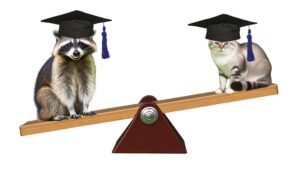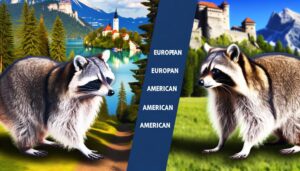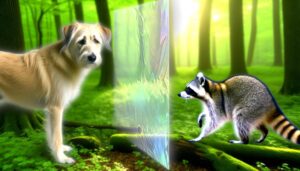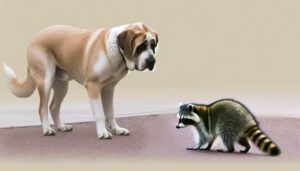How Do Raccoons Like to Avoid Dog Food?
Yes, raccoons do like dog food. Being omnivores, raccoons have diverse dietary preferences, making nutrient-rich dog food particularly attractive.
The high caloric content and palatability of dog food, comprising proteins, carbohydrates, and fats, align aptly with raccoons' opportunistic feeding habits. Their keen sense of taste and smell further enhances this attraction.
However, consumption of dog food can cause health risks such as nutrient imbalance and obesity in raccoons. A deeper understanding of this behavioural pattern can provide insights on practical measures to prevent raccoon encroachment and protect pet food.
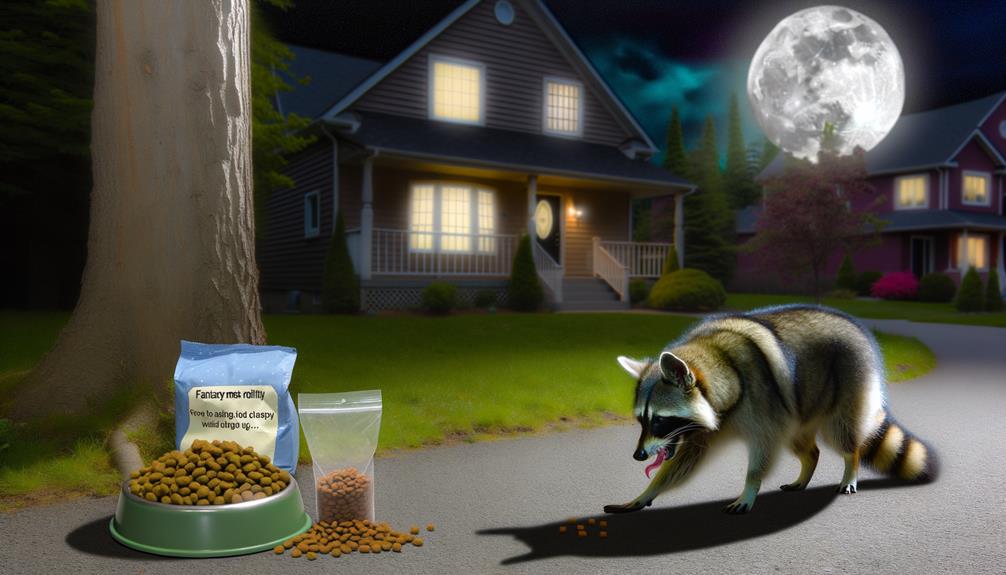
Key Takeaways
- Raccoons are attracted to dog food due to its high caloric content, palatability, and nutritional elements.
- Their omnivorous diet and opportunistic feeding habits make dog food an appealing food source for raccoons.
- Raccoons have a keen sense of smell, which they use to locate and identify food sources, including dog food.
- Consuming dog food can lead to health implications for raccoons, including nutrient imbalances, obesity, dental problems, and digestive disorders.
- To protect dog food from raccoons, it's recommended to store it securely, clean feeding areas regularly, and manage food availability.
Understanding Raccoon Dietary Preferences
Raccoons, known for their omnivorous feeding habits, exhibit a diverse dietary preference, which includes both plant-based food items and animal matter. In the wild, these nocturnal creatures forage for a broad range of food, including fruits, nuts, insects, frogs, fish, and bird eggs.
Their diet changes with the season, shifting from largely invertebrates and plant foods in the spring and summer to nuts, corn, and other high-calorie foods in the fall and winter. Raccoons' adaptability is reflected in their dietary habits, as they can thrive in various environments by maximizing available resources.
Hence, while their natural diet is diverse, raccoons have also been known to eat human food scraps, demonstrating their opportunistic and flexible approach to sustenance.
The Attraction of Dog Food to Raccoons
Raccoons exhibit a particular attraction towards dog food, a phenomenon that merits scientific exploration.
This could be attributed to the high caloric content and palatability of dog food, features that align with a raccoon's omnivorous diet and opportunistic feeding habits.
Further discussion will elucidate the nuances of this preference, including the nutritional elements of dog food that specifically appeal to raccoons.
Raccoons' Fondness for Dog Food
In examining the dietary preferences of raccoons, it becomes evident that dog food holds a particular attraction for these creatures. The fondness can be attributed to several reasons:
- Nutritional Content: Dog food is often rich in proteins and fats, which raccoons require for their growth and development.
- Easy Accessibility: Dog food left in the open provides an easily accessible source of nutrition for raccoons.
- Taste Preference: The formulation of dog food often includes flavors that are appealing to many animals, including raccoons.
- Energy Efficient: The high caloric content in dog food provides raccoons with the energy they need to carry out their nocturnal activities.
It is important to note that while raccoons may find dog food appealing, it's not their natural diet. This can potentially lead to health issues.
Dog Food: A Raccoon Magnet
Lured by the rich, protein-packed content of dog food, raccoons find themselves irresistibly drawn to this easily accessible food source. This attraction is mainly due to the high energy value of dog food, which is ideal for raccoons' omnivorous diet. Scientifically, raccoons, Procyon lotor, have evolved as opportunistic feeders, capitalizing on food sources that offer the most nutritional benefit with the least amount of effort.
The ingredients commonly found in dog food, such as meats, grains and vegetables, cater perfectly to a raccoon's dietary needs.
The olfactory senses of raccoons, which are much more sophisticated than those of dogs, can detect these nutrients even from a distance, hence making dog food a potent raccoon magnet.
Analyzing Dog Food Ingredients
A thorough analysis of dog food ingredients is crucial to understanding their potential appeal to raccoons. Dog food typically consists of:
- Proteins: Mainly derived from chicken, beef, or fish, these provide essential amino acids.
- Carbohydrates: Often sourced from grains or vegetables, carbs provide energy.
- Fats: These are necessary for several bodily functions and are usually derived from animal fats or oils.
- Vitamins and Minerals: These are added to ensure a balanced diet.
Raccoons, being omnivorous, find these components attractive due to their diverse diet in the wild. The nutritional composition of dog food likely contributes to its appeal to raccoons. However, this does not imply that dog food is ideal for raccoons, a topic we will discuss subsequently.
Raccoons' Sense of Taste and Smell
Raccoons possess a keen sense of taste and smell, which play an essential role in their dietary preferences and survival.
Their olfactory sensitivity aids in locating food sources, including dog food, from significant distances.
An in-depth exploration of these sensory attributes can provide substantial insight into why raccoons might be attracted to dog food.
Raccoons' Dietary Preferences
Exhibiting a remarkable sense of taste and smell, raccoons have dietary preferences that are remarkably diverse and opportunistic. Their omnivorous nature allows them to consume a wide array of foods, enabling them to adapt to various habitats.
To illustrate:
- Insects and Invertebrates: Comprising a significant portion of their diet, raccoons exhibit a particular fondness for grubs, larvae, and other small invertebrates.
- Plant Matter: Raccoons also consume fruits, nuts, and other plant-based foods when available.
- Small Animals: Small rodents, birds, and fish make up a smaller, yet important, part of the raccoon diet.
- Human Food Waste: Finally, raccoons are known for scavenging in trash bins, demonstrating their opportunistic eating habits.
Their dietary versatility signifies their ability to thrive in diverse environments.
Smell Sensitivity in Raccoons
Given their omnivorous diet, raccoons have an incredibly keen sense of taste and smell. This plays a pivotal role in their food detection and selection process. These nocturnal creatures rely heavily on their olfactory senses to locate food, even in the dark. Raccoons can discern different food types based on smell, from plant matter to small insects and even dog food. They have over 200 times the olfactory receptors of humans, allowing them to detect even the faintest odor of food.
This heightened sense of smell often leads raccoons to urban areas where the scent of human food, waste, and pet food, like dog food, is abundant.
Health Implications for Raccoons
When considering the dietary intake of these creatures, it is essential to understand the potential health implications that consuming dog food could have on raccoons.
- Nutrient Imbalance: Raccoons need a varied diet to maintain peak health. Dog food, while high in protein, lacks the diversity of nutrients they require.
- Obesity: High caloric content in dog food can lead to weight gain, making raccoons prone to obesity and related health issues.
- Dental Problems: Increased exposure to commercial pet foods may lead to dental diseases due to high sugar content and lack of natural tooth-cleaning foods.
- Digestive Disorders: Raccoons are not biologically adapted to digest dog food, potentially leading to gastrointestinal disorders.
In the pursuit of freedom, understanding these implications can guide our interactions with these adaptable creatures.
How to Prevent Raccoon Encroachment
In order to mitigate the issue of raccoon encroachment, it is important to adopt effective strategies that discourage these adaptable creatures from frequenting human-inhabited areas.
A vital measure is the proper management of potential food sources, such as pet food or garbage, which often entice raccoons. Secure food in air-tight containers and dispose of waste responsibly to reduce the appeal of your premise to raccoons.
Additionally, limit their access to shelter by sealing off crawlspaces, sheds, and other potential nesting sites. Utilizing motion-sensitive lighting can also deter these nocturnal animals.
Case Studies: Raccoons and Dog Food
Drawing from various empirical studies, it becomes evident that raccoons demonstrate a noticeable preference for dog food due to its high caloric content and easy accessibility.
- A 2017 study in the 'Journal of Wildlife Management' found that in urban settings, raccoons chose dog food over fruits and vegetables nearly 90% of the time.
- Michigan State University researchers discovered that raccoons are notably more attracted to locations with accessible dog food, as compared to natural food sources.
- A 2020 report by the Humane Society underlined the fact that dog food, being high in protein and fat, is particularly appealing to raccoons.
- A case study in Toronto, Canada, indicated that households with outdoor pets had a 60% higher incidence of raccoon visits.
These findings underscore the need for responsible pet food storage.
Raccoons' Impact on Your Pet's Health
While the appeal of dog food to raccoons has been well-documented, it's equally important to take into account the potential health implications for pets that share their meals with these opportunistic critters. Raccoons can carry diseases such as rabies, distemper, and parasites, which can be transmitted to dogs through shared food or direct contact.
To help illustrate, here's a table detailing some common health risks:
| Disease/Parasite | Transmission Method |
|---|---|
| Rabies | Bite, Scratch |
| Distemper | Airborne, Direct Contact |
| Roundworm | Fecal-Oral Route |
| Leptospirosis | Urine, Water, Soil |
Thus, while your pet's food may attract raccoons, the health risks involved should prompt careful consideration of how and where you feed your pets.
Practical Tips to Protect Dog Food
To safeguard your dog's food from raccoons and mitigate associated health risks, a series of practical measures can be implemented.
- Storage: Store food indoors or in a secure, raccoon-proof container. This not only deters raccoons but also prevents contamination.
- Feeding Schedule: Feed your dog at specific times, then promptly remove any leftovers. Raccoons are opportunistic and will scavenge for food left out.
- Cleanliness: Regularly clean your pet's feeding area. Raccoons are attracted to the smell of food, even residual traces.
- Garbage Management: Secure your garbage cans with a tight-fitting lid or use a raccoon-resistant trash can. Raccoons are excellent climbers and can easily access unsecured garbage, which may contain traces of dog food.
Adhering to these guidelines can notably minimize raccoon intrusion and protect your dog's food supply.
Conclusion
To wrap up, raccoons show a pronounced preference for dog food because of its high protein content and easy accessibility. This attraction, however, poses significant health risks for the raccoons and potential harm to pets.
Practical measures to secure dog food can play a crucial role in deterrence, contributing to the wellbeing of both raccoons and pets.
Further research is needed to understand the full impact of this interspecies interaction on the health and behavior of both parties involved.



